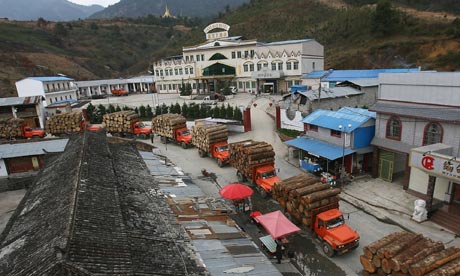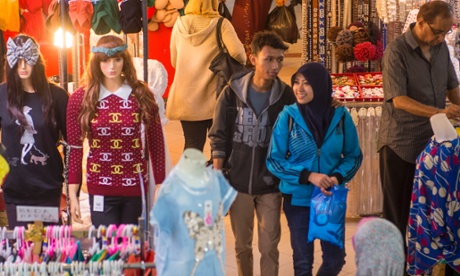In 2015, south-east Asia will become one sprawling economic zone encompassing Burma, Thailand, Cambodia, Laos, Vietnam, Malaysia, Singapore, Indonesia, the Philippines and Brunei.
Already bound by myriad political and trade agreements, these 10 countries comprising Asean (Association of Southeast Asian Nations) account for 9% of the world's population – with some 600 million people, twice the size of the US – and have a combined GDP of $1.8tn (£1.14tn).
China has long had one foot in the region, which is home to rich oil, gas, mineral, hydropower, rice, palm oil, coffee and timber resources. By 2015, however, bilateral trading between China and Asean, which began with a fair-trade agreement in 2010, will have more than doubled from $231bn to $500bn, making China Asean's biggest trading partner, according to China expert Dr Ken Shao of Australia's Murdoch University.
"China's investment in south-east Asia is growing at a double-digit speed annually," says Shao. "In 2011 to 2012, China's top six investment destinations in south-east Asia were Indonesia, Vietnam, Philippines, Malaysia, Thailand and Singapore – with textiles, electrics, steel, shipbuilding, chemical and IT popular investment themes."
Beijing hopes to pull even more purse strings by establishing a regional Asean bank – a so-called "mini Asian development bank" – to help small and medium businesses invest, fund infrastructure projects and promote development in south-western China, independent sources recently told Reuters.
Already the provider of more loans to developing countries than the World Bank, according to research by the Financial Times, China finances numerous agricultural, hydropower, housing, railway, roadworks and mining projects in the region, particularly in Cambodia, Laos, Burma, Vietnam and the Philippines.
While many Asean countries have welcomed China's investment – such as the $6bn Brunei-Chinese refinery deal inked in November – some have distanced themselves geopolitically from Beijing.
Last year Burma shelved a Chinese-funded $3.6bn dam on the Irrawaddy river, citing environmental concerns, though analysts believe the move was intended to block China's military and political influence over the country.
While the long-term impact of China's many hydroelectric projects are increasingly questioned both regionally and abroad, from Beijing they can be seen as a part of a wider effort to "divert water resources for Chinese use", according to Dr Larry Wortzel of the US-China Security Review Commission, as well as "move and control low-level value manufacturing, like textiles, to south-east Asia, [and] have access to rice, vegetables and fruits, and extract natural resources".
Wildlife groups say Chinese demand for traditional medicine and exotic meats accounts for its strong hold over the illegal wildlife trade across south-east Asia, including tigers, turtles and pangolins. Militarily, China is amping-up its presence in the region, where it has historically supplied assistance to Burma, Cambodia and Laos.
The region's best-funded military is engaged in a longstanding dispute with the Philippines over the Spratly Islands in the South China Sea (which many other Asean nations also hold partial claim to) and will not shy from using force to intimidate its neighbours, says Wortzel, as Beijing "will not yield on territorial claims in the region".
"One advantage Beijing has it that the Asean states have avoided becoming a military alliance – and they do not fully trust each other – so Beijing faces no major foe," Wortzel says. Next month, however, the Philippines and US will hold joint military drills near the Spratly Islands – a move China has not yet responded to.











